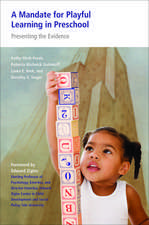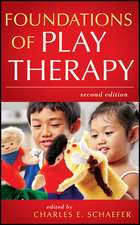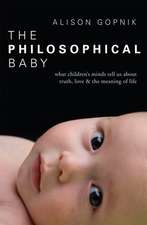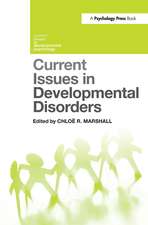Child Psychology: A Handbook of Contemporary Issues
Editat de Lawrence Balter, Catherine S. Tamis-LeMondaen Limba Engleză Paperback – 11 mar 2016
The first three sections highlight research that is organized chronologically by age: Infancy, Childhood, and Adolescence. Within each section, individual chapters address contemporary research on a specific area of development, such as learning, cognition, social, and emotional development at that period in childhood. The fourth section, Ecological Influences, emphasizes contextual influences relevant to children of all ages, including risk and protective processes, family and neighborhood context, race and ethnicity, peer relations, the effects of poverty, and the impact of the digital world.
Child Psychology also features a unique focus on four progressive themes. First, emphasis is placed on theory and explanation—the "why and how" of the developmental process. Second, explanations of a transactional and multidimensional nature of development are at the forefront of all chapters. Third, the multi-faceted approach to development highlights contextual influences and cultural diversity among children from different communities and backgrounds. Finally, methodological innovation is a key concern, and research tools presented across chapters span the full array available to developmental scientists who focus on different systems and levels of analysis.
The thoroughness and depth of this book, in addition to its methodological rigor, make it an ideal handbook for researchers, practitioners, policy makers, and advanced students across a range of disciplines, including psychology, education, economics and public policy.
| Toate formatele și edițiile | Preț | Express |
|---|---|---|
| Paperback (1) | 688.89 lei 6-8 săpt. | |
| Taylor & Francis – 11 mar 2016 | 688.89 lei 6-8 săpt. | |
| Hardback (1) | 1582.86 lei 6-8 săpt. | |
| Taylor & Francis – 11 mar 2016 | 1582.86 lei 6-8 săpt. |
Preț: 688.89 lei
Preț vechi: 919.15 lei
-25% Nou
Puncte Express: 1033
Preț estimativ în valută:
131.82€ • 137.98$ • 109.72£
131.82€ • 137.98$ • 109.72£
Carte tipărită la comandă
Livrare economică 31 martie-14 aprilie
Preluare comenzi: 021 569.72.76
Specificații
ISBN-13: 9781848724839
ISBN-10: 1848724837
Pagini: 522
Ilustrații: 17 black & white tables
Dimensiuni: 178 x 254 x 31 mm
Greutate: 0.91 kg
Ediția:Revised
Editura: Taylor & Francis
Colecția Psychology Press
Locul publicării:Oxford, United Kingdom
ISBN-10: 1848724837
Pagini: 522
Ilustrații: 17 black & white tables
Dimensiuni: 178 x 254 x 31 mm
Greutate: 0.91 kg
Ediția:Revised
Editura: Taylor & Francis
Colecția Psychology Press
Locul publicării:Oxford, United Kingdom
Cuprins
Part I: Infancy 1. A Biopsychosocial Model of Self-Regulation in Infancy Susan D. Calkins, Nicole B. Perry and Jessica M. Dollar 2. Parental Sensitivity and Infant Attachment, Esther M. Leerkes, Lindsey Gedaly and Jinni Su 3. Language Acquisition: From Words to World and Back Again Amy Pace, Dani F. Levine, Giovanna Morini, Kathy Hirsh-Pasek and Roberta Michnick Golinkoff 4. Establishing Cognitive Organization in Infancy: From Perceptual Grouping of Objects to Social Classification of Faces, Paul C. Quinn 5. Infant Origins of Social Cognition Sheila Krogh-Jespersen and Amanda Woodward Part II: Childhood 6. Self-Regulation in Early Childhood: Theory and Measurement Michael J. Sulik, M. Paula Daneri, Alyssa I. Pintar, and Clancy Blair 7. Sibling and Peer Relationships in Early Childhood Amanda Aldercotte, Naomi White and Claire Hughes 8. Objects, Conversations, and Young Children’s Learning about Science, Technology, Engineering, and Mathematics (STEM) David H. Uttal, Catherine A. Haden, Maria Marcus and Erin A. Jant 9. Children’s Dynamic Gender Identities: Cognition, Context, and Culture May Ling Halim, Kristina M. Zosuls, Diane N. Ruble, Catherine S. Tamis-LeMonda, Seunghee Amy Baeg, Abigail Walsh, and Keith H. Moy 10. Emotion-Related Self-Regulation, and Children’s Social, Psychological, and Academic Functioning Nancy Eisenberg, Tracy L. Spinrad, and Carlos Valiente Part III: Adolescence 11. Peer Relationships in Cultural Context Erika Y. Niwa, Leoandra Onnie Rogers and Niobe Way 12. Adolescent Decision Making and Risk Taking Natasha Duell, Grace Icenogle and Laurence Steinberg 13. Morality, Context, and Development Kelly Lynn Mulvey, Aline Hitti, Judith G. Smetana, and Melanie Killen 14. Ethnic-Racial Identity: Conceptualization, Development, and Youth Adjustment Adriana J. Umaña-Taylor 15. Social Aggression and Digital Communication in Adolescence Marion K. Underwood and Samuel E. Ehrenreich Part IV: Ecological Influences 16. Family Systems Children’s Social Development Jenessa L. Malin, Natasha J. Cabrera, Elizabeth Karberg, and Katrina Taschman 17. Neighborhood Context and Child Development Elizabeth A. Shuey, Tama Leventhal, Margaret Elliott and Veronique Dupéré 18. Egalitarian Socialization in Ethnically Diverse Families: Liberty and Justice for All Diane L. Hughes, Juan Del Toro and Jason R.D. Rarick 19. Risk and Resilience in Child Development Ann S. Masten and Madelyn H. Labella 20. Digital Game Features and Play Contexts: Impact on Learning and Development Daphne Bavelier and Lori M. Takeuchi 21. Money, Time, and Peers in Antipoverty Programs Hirokazu Yoshikawa, Ana María Nieto, Teresa Eckrich Sommer, P. Lindsay Chase-Lansdale, Thomas S. Weisner and Owen Senders
Notă biografică
Lawrence Balter is Professor Emeritus at New York University where he taught developmental psychology, child psychopathology, and diagnostic psychological assessment. Balter created study abroad initiatives in developmental psychology at the Piaget Archives at the University of Geneva, NYU in Prague, and San Juan, Puerto Rico. He is a recipient of a Professor of the Year award at NYU. Balter is an internationally renowned parenting expert who has appeared regularly in the electronic media, has published books for parents and children, and was a columnist for numerous trade magazines. He received the Distinguished Lifetime Contribution award from APA’s Division of Media Psychology. He serves on the Advisory Board of The Future of Children, a joint publication of Princeton University and the Brookings Institution and is a Consulting Editor at NAEYC's Young Children.
Catherine S. Tamis-LeMonda is Professor of Developmental Psychology at New York University’s Steinhardt School of Culture, Education, and Human Development. She studies intersections among children’s emerging skills in language, communication, motor and social domains across the first years of life. Her research is focused on the socio- cultural contexts of early development, especially the ways that infant-parent language interactions and everyday parenting practices affect children’s developmental trajectories across cultural communities within the U.S. and internationally.
Catherine S. Tamis-LeMonda is Professor of Developmental Psychology at New York University’s Steinhardt School of Culture, Education, and Human Development. She studies intersections among children’s emerging skills in language, communication, motor and social domains across the first years of life. Her research is focused on the socio- cultural contexts of early development, especially the ways that infant-parent language interactions and everyday parenting practices affect children’s developmental trajectories across cultural communities within the U.S. and internationally.
Recenzii
"This third edition of Child Psychology, edited by Steinhardt professor emeritus Lawrence Balter and Steinhardt professor Catherine Tamis-LaMonda, continues the tradition of showcasing cutting-edge research in the field of developmental science, including individual differences, dynamic systems and processes, and contexts of development."- NYU Research Digest
'The field of child development is so fast moving that this third—and very much revised—edition of this well-regarded volume is most welcome. The scholars contributing chapters are top notch and the organization of the volume makes it easily accessible to those especially interested in particular developmental periods (infancy, childhood, adolescence). By covering specific topics within these periods, a reader can follow the developmental course of subjects like learning, cognition, and social and emotional development. The section on ecological influences is especially significant, calling attention to topics like the family, the neighborhood, and ethnic/racial variation across developmental epochs. I recommend this book highly to those interested in child development in the modern world.' – Jay Belsky, Robert M. and Natalie Reid Dorn Professor, University of California, Davis
'What criteria does one seek in an advanced developmental volume? Presumably, breadth, depth, accuracy, and contemporaneity: breadth to cover the range of issues with which child psychology is concerned, depth to bring home to the reader the complexities underpinning those issues, accuracy in display of technical quality, and contemporaneity to convey a sense of present-day excitement about the science. Normally, these criteria are very difficult to achieve between one set of covers. Here, Balter and Tamis-LeMonda have designed a book with the apposite breadth, and recruited talented scholars to plumb the depths of significant issues in the field with scientific rigor and a distinctive "in the moment" feeling. That the editors have steered their contributors to readability and comprehensibility beyond those four criteria is a value-added achievement in this third edition of Child Psychology—their own crowning contribution to advancing developmental science.' – Marc H. Bornstein, Editor, Parenting: Science and Practice
'Transformative change in science requires transformational change in how scientists conceptualize natural and built environments. This third edition of Child Psychology continues the editors’ journey to effect such change. A new cast of authors contribute to a volume that gives reality to the adage that "three is a charm." Through persistent and expanded attention to individual differences and context effects on developmental process, to change stimulated by systemic organization and reorganization, and to methodological innovations inclusive of broader views of epistemology, the editors and authors challenge readers to join the quest to truly understand human development from infancy through adolescence.' – Hiram E. Fitzgerald, University Distinguished Professor, Michigan State University
'Written by some of the most prominent researchers, this book offers rich, comprehensive, and up-to-date coverage of the key themes in cognitive, emotional, and social development from infancy to adolescence. It is highly recommended as a valuable resource for developmental psychologists, scholars, and graduate students.' – Grazyna Kochanska, Stuit Professor of Developmental Psychology, University of Iowa
'This is the kind of anthology that inspired me as a student, and continues to inspire me as a scientist. Child Psychology is a compendium of state-of-the-art writings about cutting-edge issues in developmental science, thoughtfully curated to reflect central themes of the field, and filled with contributions from leading scholars of developmental science. Seasoned developmental researchers and their students will be richly rewarded by this volume.' – Ross A. Thompson, Distinguished Professor of Psychology, University of California, Davis
"This third edition of Child Psychology, edited by Steinhardt professor emeritus Lawrence Balter and Steinhardt professor Catherine Tamis-LaMonda, continues the tradition of showcasing cutting-edge research in the field of developmental science, including individual differences, dynamic systems and processes, and contexts of development." - NYU Research Digest
'The field of child development is so fast moving that this third—and very much revised—edition of this well-regarded volume is most welcome. The scholars contributing chapters are top notch and the organization of the volume makes it easily accessible to those especially interested in particular developmental periods (infancy, childhood, adolescence). By covering specific topics within these periods, a reader can follow the developmental course of subjects like learning, cognition, and social and emotional development. The section on ecological influences is especially significant, calling attention to topics like the family, the neighborhood, and ethnic/racial variation across developmental epochs. I recommend this book highly to those interested in child development in the modern world.' – Jay Belsky, Robert M. and Natalie Reid Dorn Professor, University of California, Davis
'What criteria does one seek in an advanced developmental volume? Presumably, breadth, depth, accuracy, and contemporaneity: breadth to cover the range of issues with which child psychology is concerned, depth to bring home to the reader the complexities underpinning those issues, accuracy in display of technical quality, and contemporaneity to convey a sense of present-day excitement about the science. Normally, these criteria are very difficult to achieve between one set of covers. Here, Balter and Tamis-LeMonda have designed a book with the apposite breadth, and recruited talented scholars to plumb the depths of significant issues in the field with scientific rigor and a distinctive "in the moment" feeling. That the editors have steered their contributors to readability and comprehensibility beyond those four criteria is a value-added achievement in this third edition of Child Psychology—their own crowning contribution to advancing developmental science.' – Marc H. Bornstein, Editor, Parenting: Science and Practice
'Transformative change in science requires transformational change in how scientists conceptualize natural and built environments. This third edition of Child Psychology continues the editors’ journey to effect such change. A new cast of authors contribute to a volume that gives reality to the adage that "three is a charm." Through persistent and expanded attention to individual differences and context effects on developmental process, to change stimulated by systemic organization and reorganization, and to methodological innovations inclusive of broader views of epistemology, the editors and authors challenge readers to join the quest to truly understand human development from infancy through adolescence.' – Hiram E. Fitzgerald, University Distinguished Professor, Michigan State University
'Written by some of the most prominent researchers, this book offers rich, comprehensive, and up-to-date coverage of the key themes in cognitive, emotional, and social development from infancy to adolescence. It is highly recommended as a valuable resource for developmental psychologists, scholars, and graduate students.' – Grazyna Kochanska, Stuit Professor of Developmental Psychology, University of Iowa
'This is the kind of anthology that inspired me as a student, and continues to inspire me as a scientist. Child Psychology is a compendium of state-of-the-art writings about cutting-edge issues in developmental science, thoughtfully curated to reflect central themes of the field, and filled with contributions from leading scholars of developmental science. Seasoned developmental researchers and their students will be richly rewarded by this volume.' – Ross A. Thompson, Distinguished Professor of Psychology, University of California, Davis
"This third edition of Child Psychology, edited by Steinhardt professor emeritus Lawrence Balter and Steinhardt professor Catherine Tamis-LaMonda, continues the tradition of showcasing cutting-edge research in the field of developmental science, including individual differences, dynamic systems and processes, and contexts of development." - NYU Research Digest
Descriere
Child Psychology: A Handbook of Contemporary Issues is the only handbook to comprehensively cover infant through adolescent development within one volume. It uniquely represents the current state of the field by showcasing the most cutting-edge empirical research of leading developmental scientists from around the globe.
The incredible depth and breadth within one concise package makes Child Psychology an invaluable and practical resource for researchers, advanced undergraduates and graduate students of developmental science and human development.
The incredible depth and breadth within one concise package makes Child Psychology an invaluable and practical resource for researchers, advanced undergraduates and graduate students of developmental science and human development.














